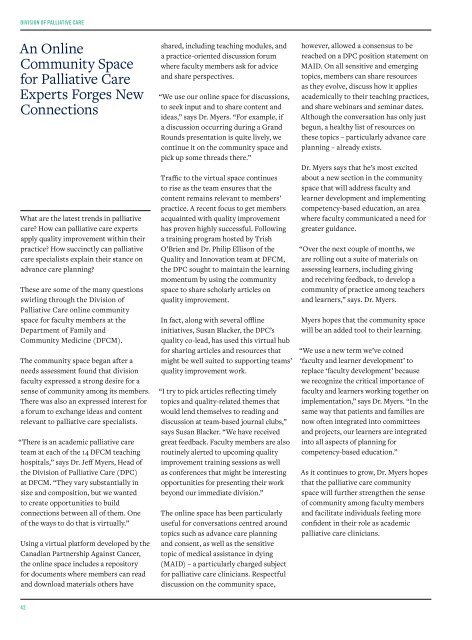DFCM Annual Report 2017-2018
Create successful ePaper yourself
Turn your PDF publications into a flip-book with our unique Google optimized e-Paper software.
DIVISION OF PALLIATIVE CARE<br />
An Online<br />
Community Space<br />
for Palliative Care<br />
Experts Forges New<br />
Connections<br />
What are the latest trends in palliative<br />
care? How can palliative care experts<br />
apply quality improvement within their<br />
practice? How succinctly can palliative<br />
care specialists explain their stance on<br />
advance care planning?<br />
These are some of the many questions<br />
swirling through the Division of<br />
Palliative Care online community<br />
space for faculty members at the<br />
Department of Family and<br />
Community Medicine (<strong>DFCM</strong>).<br />
The community space began after a<br />
needs assessment found that division<br />
faculty expressed a strong desire for a<br />
sense of community among its members.<br />
There was also an expressed interest for<br />
a forum to exchange ideas and content<br />
relevant to palliative care specialists.<br />
“There is an academic palliative care<br />
team at each of the 14 <strong>DFCM</strong> teaching<br />
hospitals,” says Dr. Jeff Myers, Head of<br />
the Division of Palliative Care (DPC)<br />
at <strong>DFCM</strong>. “They vary substantially in<br />
size and composition, but we wanted<br />
to create opportunities to build<br />
connections between all of them. One<br />
of the ways to do that is virtually.”<br />
Using a virtual platform developed by the<br />
Canadian Partnership Against Cancer,<br />
the online space includes a repository<br />
for documents where members can read<br />
and download materials others have<br />
shared, including teaching modules, and<br />
a practice-oriented discussion forum<br />
where faculty members ask for advice<br />
and share perspectives.<br />
“We use our online space for discussions,<br />
to seek input and to share content and<br />
ideas,” says Dr. Myers. “For example, if<br />
a discussion occurring during a Grand<br />
Rounds presentation is quite lively, we<br />
continue it on the community space and<br />
pick up some threads there.”<br />
Traffic to the virtual space continues<br />
to rise as the team ensures that the<br />
content remains relevant to members’<br />
practice. A recent focus to get members<br />
acquainted with quality improvement<br />
has proven highly successful. Following<br />
a training program hosted by Trish<br />
O’Brien and Dr. Philip Ellison of the<br />
Quality and Innovation team at <strong>DFCM</strong>,<br />
the DPC sought to maintain the learning<br />
momentum by using the community<br />
space to share scholarly articles on<br />
quality improvement.<br />
In fact, along with several offline<br />
initiatives, Susan Blacker, the DPC’s<br />
quality co-lead, has used this virtual hub<br />
for sharing articles and resources that<br />
might be well suited to supporting teams’<br />
quality improvement work.<br />
“I try to pick articles reflecting timely<br />
topics and quality-related themes that<br />
would lend themselves to reading and<br />
discussion at team-based journal clubs,”<br />
says Susan Blacker. “We have received<br />
great feedback. Faculty members are also<br />
routinely alerted to upcoming quality<br />
improvement training sessions as well<br />
as conferences that might be interesting<br />
opportunities for presenting their work<br />
beyond our immediate division.”<br />
The online space has been particularly<br />
useful for conversations centred around<br />
topics such as advance care planning<br />
and consent, as well as the sensitive<br />
topic of medical assistance in dying<br />
(MAID) – a particularly charged subject<br />
for palliative care clinicians. Respectful<br />
discussion on the community space,<br />
however, allowed a consensus to be<br />
reached on a DPC position statement on<br />
MAID. On all sensitive and emerging<br />
topics, members can share resources<br />
as they evolve, discuss how it applies<br />
academically to their teaching practices,<br />
and share webinars and seminar dates.<br />
Although the conversation has only just<br />
begun, a healthy list of resources on<br />
these topics – particularly advance care<br />
planning – already exists.<br />
Dr. Myers says that he’s most excited<br />
about a new section in the community<br />
space that will address faculty and<br />
learner development and implementing<br />
competency-based education, an area<br />
where faculty communicated a need for<br />
greater guidance.<br />
“Over the next couple of months, we<br />
are rolling out a suite of materials on<br />
assessing learners, including giving<br />
and receiving feedback, to develop a<br />
community of practice among teachers<br />
and learners,” says. Dr. Myers.<br />
Myers hopes that the community space<br />
will be an added tool to their learning.<br />
“We use a new term we’ve coined<br />
‘faculty and learner development’ to<br />
replace ‘faculty development’ because<br />
we recognize the critical importance of<br />
faculty and learners working together on<br />
implementation,” says Dr. Myers. “In the<br />
same way that patients and families are<br />
now often integrated into committees<br />
and projects, our learners are integrated<br />
into all aspects of planning for<br />
competency-based education.”<br />
As it continues to grow, Dr. Myers hopes<br />
that the palliative care community<br />
space will further strengthen the sense<br />
of community among faculty members<br />
and facilitate individuals feeling more<br />
confident in their role as academic<br />
palliative care clinicians.<br />
42


